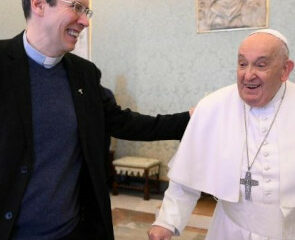 In our spiritual family Cor Unum, accompaniment is one of the ways to progress in the continuation of Jesus Christ, in the closeness of Christ of the Gospels. It is a proposal and not an obligation because the decision remains personal and free. However, the accompaniment remains an opportunity to seize. It helps to hold in fidelity to our Project of Life: to respond to the call to holiness in the heart of the world, rooted in the vocation and mission of all the people of God (PdV No. 8) whatever the difficulties.
In our spiritual family Cor Unum, accompaniment is one of the ways to progress in the continuation of Jesus Christ, in the closeness of Christ of the Gospels. It is a proposal and not an obligation because the decision remains personal and free. However, the accompaniment remains an opportunity to seize. It helps to hold in fidelity to our Project of Life: to respond to the call to holiness in the heart of the world, rooted in the vocation and mission of all the people of God (PdV No. 8) whatever the difficulties.
Need for spiritual accompaniment?
Many Christians live unsased. Many people simply rely on their ability to discern through reason and prayer. And fortunately, it often works well.
Search
Accompanying becomes necessary when there are difficulties in finding one's way or deciding on a direction. We can use it when spiritual life is difficult or tumultuous. Similarly, when human difficulties upset the faith, when a more radical desire for conversion occurs, recourse can be useful. The latter is common when it comes to choosing a temporary or definitive commitment to a spiritual family. These particular moments often trigger the search for accompaniment. It is then a question of discerning more clearly what is happening in itself and of looking for how to respond most faithfully to its Christian vocation.
Purpose
The purpose of the accompaniment is to adjust more and more to the life of God, to an evangelical life according to the Heart of Jesus in the concrete context in which I stand. This aim takes us out of a strictly moral perspective where the central issue is about good and evil.
Mind
In spiritual accompaniment comes above all the question: how to discern and respond to the calls that God addresses to me in the Holy Spirit? This issue is more difficult to deal with while not eliminating the former. The accompaniment has its place here.
Retirement
In many cases, one-time support times, such as during a retreat, may be sufficient to clarify the calls heard and our answers. All the more so, when there is a nice sharing dynamic in the monthly teams.
The important thing is not to remain unsavory during delicate moments and to have deepened the notion of discernment for everyday life. The latter remains indispensable.
The Importance of Spiritual Discernment
In any spiritual discernment (in the broadest sense), it is a question of scrutinizing the elements for or against a specific choice, in the short and long term. It is a pre-decision aid that makes sense. This method based on reason is still relevant and remains necessary in the life of any Christian person or not. Faith does not oppose reason, it pays attention to certain priorities (attention to the most vulnerable, coherence of one's own life between faith and commitments, faithful listening to the Word of God, etc.).
Time
Many mistakes would be avoided if we really took the time to put these elements down and thus re-read our lives in this dimension of Christian ethics. Yet all spiritual discernment implies going beyond this approach, especially in an Ignatian spirituality. It is no longer a question of simply looking for what is reasonably good as a citizen and a Christian. The heart of the process is to seek what will lead me, personally according to who I am, to a greater fidelity to God's will.
Prayer
This discernment is done in prolonged prayer based on the Word of God. What has been weighed rationally must be exposed before God in prolonged prayer to ask for confirmation: is this where You want me, my God? Is it this decision that corresponds to his desire? The spiritual diary of Ignatius of Loyola is instructive in this regard. When he had to draft the Constitutions of the Society of Jesus and decide in particular on the poverty regime to be lived, he listed the disadvantages and advantages of owning property or not, income. Then he lets the Spirit point the way in prayer for 40 days! We will not do the same, but the way is clear.
Motions
Peace or Joy received in prayer usually confirms a direction, a choice… but if the agitation occurs, calls into question the choice, there is a concern … Perhaps it is necessary to deepen discernment, resume prayer, or call upon a competent accompanist… Sometimes the framework of an Ignatian retreat is really necessary to discern an important issue. An accompanist who is really familiar with the "Spiritual Exercises" and the diversity of "motions" that pass through a retiree may be required.
In ordinary life, accompanists are rarely specialists in "Exercises". That is not the most important thing.
Which accompanist?
The first thing is to find in the accompaniment a benevolent and discreet listening space. This is an essential condition to be able to confide in the long term. Discretion is required both outward (no gossip) and during the exchange (not being "forced to say"). Benevolence makes it possible to say everything without fear of lapidary judgment. She beckons of God's Mercy. Benevolence becomes support, encouragement in difficult times. If these two qualities are lacking it is better to change the accompanist.
Listen
But the quality of listening must also be at the level of faith. This is necessary for her to be able to say herself in her own words, perhaps clumsily but authentically her own. For this, listening must be active to help the accompanied to clarify his faith and his way of living it. Accompanying is a work of begetment, but without the wrong actor: God alone gives birth to faith and its growth! The companions are mainly next to the accompanied in a role of witness to the work of the Spirit of God. The chaperones to emphasize only what they are witnessing, which is already a lot because it is a way of encouraging or challenging.
Revealing
Somewhere, the accompaniment serves as a revealing, to highlight what is already there but not yet deployed in a very clear and conscious way. We are no longer in the time of the "Directors of Conscience" to whom obedience had to be promised. Some have not been able to abuse this positioning which has wreaked havoc on many Christians. Today we are lucky to have come out of this rut. Our risk would be rather not to find an accompanist, especially if we remain on the figure of the priest when any Christian can accompany if he has the skills and charisma. The other risk is to find some very ignorant about the stages of spiritual life or lacking in depth. The accompaniment can then fall into insignificance. Finally, beware of gurus, the few manipulators who can exist in all states of life and all professions.
A chance to live!
The accompaniment remains a chance to live bearing in mind that God is the only true guide and that there is no ideal accompanist (or exemplary companion!). With the chosen witness, it is possible to move forward on the road of conversion in fidelity to the Jesus Christ of the Gospel and to the Church. In the absence of regular support, accompanied retreats can really help to take stock each year or according to the possibilities… The means are given to us by the Church and in our Cor Unum Family. It is up to each of us to seek to put them to good use according to what will be inspired by the Spirit.
Gwennola Rimbaut
Assistant General SVECJ (2020)






